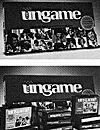
The Ungame Company
P.O Box 6382, Anaheim, CA, 92806
Released: 1984
Catalog Nos.:
The Ungame #1200
The Pocket Size Version
All Ages Version #1300
Singles Version #1310
Couples Version #1315
Families Version #1320
Spiritual Version Vol. I #1305
Spiritual Version Vol. II #1325
Teen Version #1335
Kids Version #1340
Price: $12.95
Complexity: "From Ages 5 to 105; adaptable to all levels"
Solitaire Suitability: None
***
Does the fact that a game is enthusiastically endorsed by teachers, ministers, psychologists, and parents and has sold over one million copies fill you with skepticism? Or does it intrigue you? Your reaction to the above facts may be a short summation of your feelings about The Ungame.
Never has a game been more appropriately named, for The Ungame forces you to toss all of your conventional ideas about gaming out the window. If a "game" to you implies a fierce competition of a winner and a loser, stay as far away from this one as possible. If, on the other hand, you view playing a game as a pleasant way of passing time, this bears a second look. Finally, if a game for you is an activity to break the ice and let you get to know more about the other players, this is an excellent investment.
The Ungame is designed specifically to have no competition. In fact, there is no terminal objective to the game - it can last as long as the participants are interested. Or, a specific playing time (45 minutes is suggested) may be established in advance.
The Ungame has all the conventional components: dice, markers, a board, and, most importantly, question cards. Each player rolls the die and moves his marker the indicated number of spaces. If he lands on an UNGAME space, he draws a question card, which he reads aloud and answers briefly. Questions from deck one include topics like these:
"What kind of animal would you like to be and where would you like to live?
"What is something you can do well?" Deck two has more serious topics, which are to be used later in the game. It contains questions like these:
"What is the most sentimental possession you have?"
Complete the statement, "If I could live my life over again..."
It is important to note that none of the other players may talk until their turns. For this reason, it is recommended that players keep pencil and paper beside them to make notes for responding to earlier answers if they land on a Question or Comment space. In addition, there are spaces labeled Favor Factory, Worry Wharf, Impatient Island, and so forth. A player may end up in one of these spaces if he has done a favor, worried, been impatient, or so on that day.
The fact that there is a board present makes The Ungame more game-like, thus making it easier for players to open up at the beginning. As the game progresses and the participants feel more comfortable, however, the board actually seems to impede the game.
Perhaps the creators realized this too, for there are eight pocket versions with only cards, no board. Question or Comment cards are interspersed to allow periodic interaction. The pocket Ungame versions are aimed at more specific audiences such as teens, singles, couples, and kids.
The Ungame has an interesting history. it was developed by Rhea Zakich, a woman who, after throat surgery, was told she might never speak again. She developed the game as a way of facilitating communicating and, what is more important, listening. The game is excellent at accomplishing this. It is a wonderful springboard for communication for families, friends, classes, or counseling groups. Along with ensuring that even the most quiet get a chance to speak, The Ungame forces even the most aggressive to listen.
One note of caution: perhaps no game hinges as completely as this one does upon the attitude of the players. For example, on the Question or Comment square, all it takes is one cynic asking "How long does this game last?" or "What's the point of this game?" or an embarrassing personal question to destroy the atmosphere of security and trust that is essential to the game. But, if everyone gets into the spirit, it is a wonderful experience in communication.
In short, if you find games and competition synonymous, you might not enjoy The Ungame. If, on the other hand, you view games as an opportunity for cooperation and communication, definitely check this one out.
More Adult Game Reviews
-
Game Review: Mhing
Game Review: The Ungame: Pocket Size Version
Game Review: The Lonely Mountain Lair of Smaug the Dragon
Game Review: Power Trip: For Kinetic Intellects
Back to Table of Contents -- Game News #7
To Game News List of Issues
To MagWeb Master Magazine List
© Copyright 1985 by Dana Lombardy.
This article appears in MagWeb (Magazine Web) on the Internet World Wide Web.
Other military history articles and gaming articles are available at http://www.magweb.com